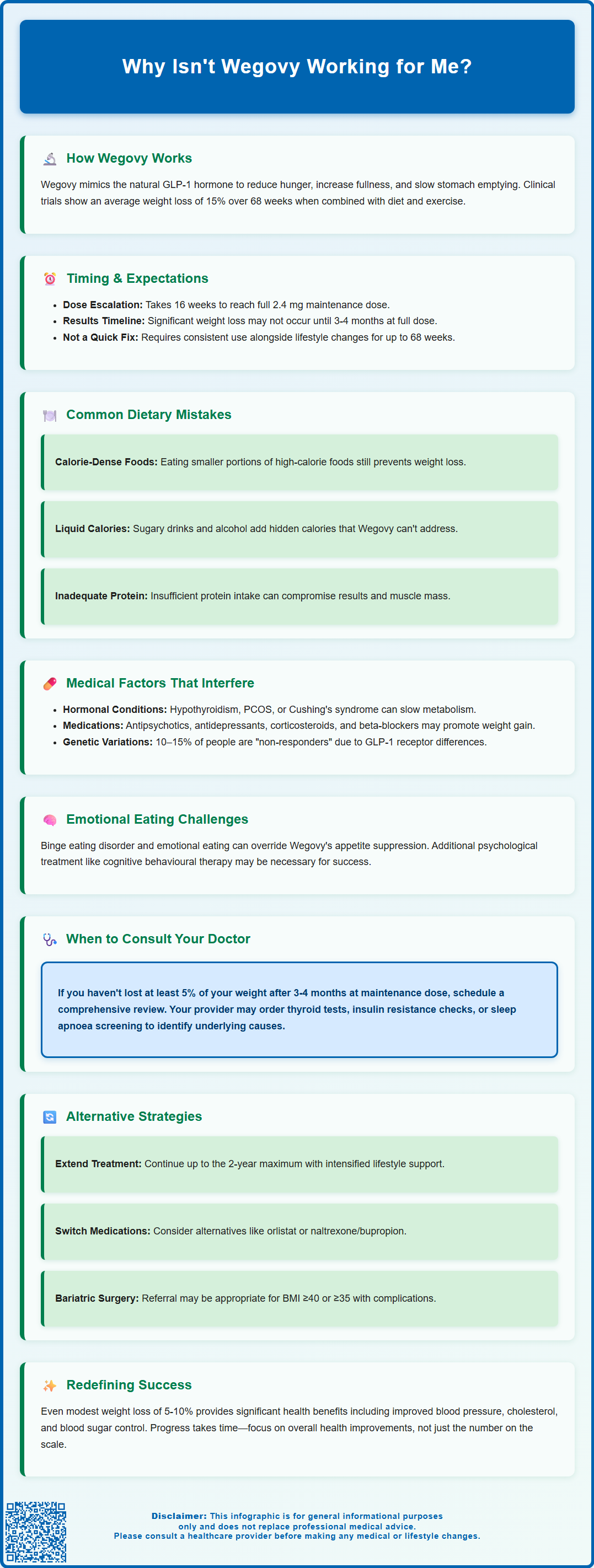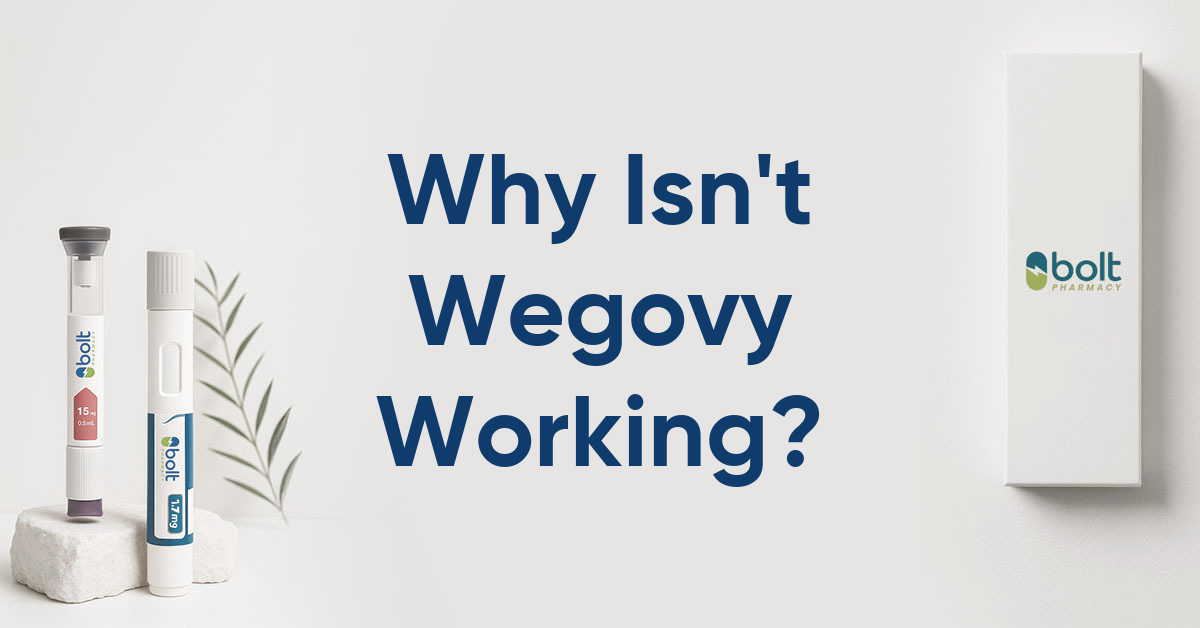Many people prescribed Wegovy (semaglutide 2.4 mg) for weight management wonder why they aren't seeing the expected results. Whilst clinical trials demonstrate significant weight loss for most participants, individual responses vary considerably. Several factors can influence Wegovy's effectiveness, including treatment duration, lifestyle modifications, medication adherence, underlying medical conditions, and concomitant medications. Understanding these variables is essential for optimising outcomes. This article explores the common reasons why Wegovy may not be working as expected and provides evidence-based guidance on what steps to take if you're not achieving meaningful weight loss despite consistent use of this GLP-1 receptor agonist.
Summary: Wegovy may not work effectively due to insufficient treatment duration (requires 16+ weeks to reach maintenance dose), inadequate lifestyle modifications, poor medication adherence, underlying medical conditions such as hypothyroidism, or concomitant medications that promote weight gain.
- Wegovy is a GLP-1 receptor agonist licensed by the MHRA for chronic weight management in adults with obesity or overweight with comorbidities.
- The medication requires 16 weeks of dose escalation to reach the 2.4 mg maintenance dose, with meaningful weight loss often not apparent until several weeks thereafter.
- Wegovy must be used alongside a reduced-calorie diet and increased physical activity—it is not effective as monotherapy.
- Underlying conditions such as hypothyroidism, PCOS, or sleep disorders can significantly impair treatment response and should be investigated.
- NICE recommends Wegovy be prescribed within specialist weight management services for a maximum duration of 2 years.
- Approximately 10–15% of patients do not achieve clinically meaningful weight loss (≥5% body weight) despite optimal adherence, and alternative treatments or bariatric surgery referral may be considered.
Table of Contents
How Wegovy Works for Weight Loss
Wegovy (semaglutide 2.4 mg) is a glucagon-like peptide-1 (GLP-1) receptor agonist licensed by the MHRA for chronic weight management in adults with obesity (BMI ≥30 kg/m²) or overweight (BMI ≥27 kg/m²) with at least one weight-related comorbidity. Understanding its mechanism of action helps explain both its effectiveness and potential limitations.
Mechanism of Action
Semaglutide mimics the naturally occurring hormone GLP-1, which is released from the intestine after eating. It works through several complementary pathways:
-
Appetite regulation: Acts on receptors in the hypothalamus to reduce hunger signals and increase feelings of fullness (satiety)
-
Gastric emptying: Slows the rate at which food leaves the stomach, prolonging the sensation of fullness after meals (this effect may diminish with ongoing treatment)
-
Blood glucose control: Enhances insulin secretion when blood glucose is elevated and suppresses glucagon release
Clinical studies show these effects can lead to reduced caloric intake, which translates to clinically significant weight loss when maintained over time.
Expected Weight Loss Timeline
Clinical trials demonstrate that Wegovy produces gradual weight reduction. In the STEP trials, participants lost an average of 15% of their initial body weight over 68 weeks when combined with lifestyle interventions. Weight loss typically:
-
Begins within the first 4–8 weeks of treatment
-
Continues progressively during dose escalation (over 16 weeks)
-
May continue for up to 68 weeks before reaching a plateau
It is important to recognise that Wegovy is not a rapid solution—meaningful results require consistent use alongside dietary modifications and increased physical activity. Individual responses vary considerably, and not everyone achieves the average weight loss seen in clinical trials.
NICE recommends Wegovy be prescribed within specialist weight management services for a maximum duration of 2 years. For people with diabetes taking insulin or sulfonylureas, blood glucose monitoring and medication dose adjustments may be needed to reduce the risk of hypoglycaemia.

Common Reasons Why Wegovy May Not Be Working
Several factors may explain why some individuals do not experience the expected weight loss with Wegovy. Identifying these reasons is essential for optimising treatment outcomes.
Insufficient Treatment Duration
Many patients expect rapid results, but Wegovy requires time to reach therapeutic effect. The medication follows a dose-escalation schedule to minimise gastrointestinal side effects:
-
Starting dose: 0.25 mg weekly for 4 weeks
-
Incremental increases every 4 weeks (0.5 mg, 1.0 mg, 1.7 mg)
-
Maintenance dose: 2.4 mg weekly (reached after 16 weeks, or longer if slower escalation is needed for tolerability)
If 2.4 mg is not tolerated, 1.7 mg may be used as the maintenance dose. Significant weight loss often does not become apparent until the maintenance dose has been established for several weeks. Assessing effectiveness before completing at least 3–4 months at the full dose may be premature.
If you miss a dose and the next scheduled dose is more than 2 days away, take the missed dose as soon as possible. If less than 2 days remain, skip the missed dose and take the next dose on the scheduled day.
Inadequate Lifestyle Modifications
Wegovy is licensed as an adjunct to a reduced-calorie diet and increased physical activity—not as monotherapy. The medication reduces appetite, but patients must actively respond to these signals by making appropriate dietary choices. Common pitfalls include:
-
Consuming calorie-dense foods despite reduced portion sizes
-
Insufficient protein intake and physical activity, which may affect body composition
-
Sedentary behaviour that limits energy expenditure
-
Liquid calories (sugary drinks, alcohol) that bypass satiety mechanisms
Medication Adherence Issues
Missed doses or inconsistent administration can significantly impair effectiveness. Wegovy must be administered weekly to maintain stable therapeutic levels. Frequent missed injections or extended gaps between doses prevent the medication from achieving its full appetite-suppressing effect.
Physiological Adaptation
Some individuals may experience a natural plateau in weight loss over time. This is a normal physiological response rather than true tolerance to the medication. The initial slowing of gastric emptying tends to diminish with ongoing treatment, though the appetite-suppressing effects generally persist.
Factors That Can Affect Wegovy's Effectiveness
Beyond the common reasons outlined above, several physiological, medical, and pharmacological factors can influence how well Wegovy works for weight management.
Metabolic and Hormonal Factors
Underlying endocrine conditions can significantly impair weight loss efforts:
-
Hypothyroidism: Untreated or inadequately managed thyroid dysfunction slows metabolic rate and may blunt Wegovy's effectiveness
-
Polycystic ovary syndrome (PCOS): Insulin resistance and hormonal imbalances can make weight loss more challenging
-
Cushing's syndrome: Excess cortisol promotes weight gain, particularly central adiposity
-
Sleep disorders: Obstructive sleep apnoea and poor sleep quality disrupt metabolic hormones (leptin, ghrelin) that regulate appetite
NICE guidance (CG189) recommends investigating potential secondary causes of obesity when weight loss interventions prove ineffective.
Concomitant Medications
Several commonly prescribed medications may affect weight management:
-
Antipsychotics: Particularly olanzapine and clozapine
-
Antidepressants: Some tricyclics and mirtazapine (SSRIs have variable effects)
-
Corticosteroids: Long-term use increases appetite and alters fat distribution
-
Insulin and sulphonylureas: Can promote weight gain through various mechanisms
-
Beta-blockers: May have modest effects on metabolic rate and exercise capacity
Patients taking these medications should discuss potential alternatives with their GP or specialist, though changes must be carefully balanced against the primary indication for treatment.
Genetic and Individual Variability
Genetic factors influence both baseline obesity risk and response to pharmacotherapy. Variations in genes encoding GLP-1 receptors, metabolic enzymes, and appetite-regulating hormones may explain why some individuals are "non-responders" to Wegovy. STEP trial data suggest approximately 10–15% of patients do not achieve clinically meaningful weight loss (≥5% body weight) despite optimal adherence.
Psychological Factors
Emotional eating, binge eating disorder, and other psychological relationships with food may override the appetite-suppressing effects of Wegovy. Addressing these factors through cognitive behavioural therapy or specialist psychological support may be necessary for treatment success.
What to Do If Wegovy Isn't Working for You
If you have been taking Wegovy at the maintenance dose for at least 3–4 months without achieving meaningful weight loss (typically defined as ≥5% of initial body weight), several steps can help identify and address the underlying issues.
Review Your Treatment Plan with Your Healthcare Provider
Schedule a comprehensive review with your healthcare provider within the specialist weight management service. This consultation should include:
-
Medication adherence assessment: Confirm you are taking the correct dose weekly without missed injections
-
Dietary review: Consider referral to a registered dietitian for detailed nutritional assessment and personalised meal planning
-
Physical activity evaluation: Discuss barriers to exercise and develop a realistic, progressive activity plan
-
Medication review: Identify any concomitant medications that may impair weight loss
Remember that NICE recommends Wegovy be used for a maximum of 2 years as part of a specialist weight management service programme.
Investigate Potential Underlying Causes
Your healthcare provider may recommend investigations to exclude secondary causes of treatment resistance:
-
Thyroid function tests (TSH, free T4) to screen for hypothyroidism
-
HbA1c and fasting glucose to assess insulin resistance or diabetes
-
Lipid profile as part of comprehensive metabolic assessment
-
Sleep study referral if obstructive sleep apnoea is suspected
NICE guidance (CG189) supports investigating these factors when weight management interventions prove ineffective.
Consider Alternative Strategies
For some patients, the following approaches may be discussed:
-
Extended treatment duration: Continuing Wegovy beyond the initial assessment period, within the 2-year maximum treatment duration
-
Intensified lifestyle intervention: Additional support within specialist weight management services
-
Alternative medications: If Wegovy proves ineffective, other UK-licensed options such as orlistat or naltrexone/bupropion may be considered (availability varies by local NHS commissioning policies)
-
Bariatric surgery referral: For individuals with BMI ≥40 kg/m² (or ≥35 kg/m² with comorbidities) who have not responded to non-surgical approaches. Lower BMI thresholds may apply for certain ethnic groups. Referral typically requires completion of a tier 3 weight management programme
When to Contact Your Healthcare Provider
Seek medical advice promptly if you experience:
-
Severe and persistent nausea, vomiting, or abdominal pain
-
Signs of pancreatitis (severe upper abdominal pain radiating to the back) – stop taking Wegovy and seek urgent medical attention
-
Symptoms of gallbladder problems (pain in upper right abdomen, especially after meals)
-
Unexplained rapid weight loss, dehydration or reduced urine output
-
If you have diabetes: symptoms of low blood sugar, especially if taking insulin or sulfonylureas
-
Changes in vision (particularly if you have diabetes with retinopathy)
Report any suspected side effects via the MHRA Yellow Card Scheme (yellowcard.mhra.gov.uk).
Remember that weight management is a long-term process requiring patience and persistence. Even modest weight loss of 5–10% can produce significant health benefits, including improved blood pressure, lipid profiles, and glycaemic control.
Frequently Asked Questions
How long does it take for Wegovy to start working?
Wegovy requires 16 weeks to reach the maintenance dose of 2.4 mg through gradual dose escalation. Meaningful weight loss typically becomes apparent after several weeks at the full maintenance dose, with continued weight reduction for up to 68 weeks when combined with lifestyle modifications.
What should I do if I'm not losing weight on Wegovy?
Schedule a comprehensive review with your healthcare provider within the specialist weight management service to assess medication adherence, dietary habits, physical activity levels, and potential underlying medical conditions. Investigations such as thyroid function tests may be recommended to exclude secondary causes of treatment resistance.
Can other medications affect how well Wegovy works?
Yes, several medications can impair weight loss, including certain antipsychotics (olanzapine, clozapine), some antidepressants (tricyclics, mirtazapine), long-term corticosteroids, insulin, sulphonylureas, and beta-blockers. Discuss potential alternatives with your GP or specialist, balancing this against the primary indication for treatment.
The health-related content published on this site is based on credible scientific sources and is periodically reviewed to ensure accuracy and relevance. Although we aim to reflect the most current medical knowledge, the material is meant for general education and awareness only.
The information on this site is not a substitute for professional medical advice. For any health concerns, please speak with a qualified medical professional. By using this information, you acknowledge responsibility for any decisions made and understand we are not liable for any consequences that may result.
Heading 1
Heading 2
Heading 3
Heading 4
Heading 5
Heading 6
Lorem ipsum dolor sit amet, consectetur adipiscing elit, sed do eiusmod tempor incididunt ut labore et dolore magna aliqua. Ut enim ad minim veniam, quis nostrud exercitation ullamco laboris nisi ut aliquip ex ea commodo consequat. Duis aute irure dolor in reprehenderit in voluptate velit esse cillum dolore eu fugiat nulla pariatur.
Block quote
Ordered list
- Item 1
- Item 2
- Item 3
Unordered list
- Item A
- Item B
- Item C
Bold text
Emphasis
Superscript
Subscript










